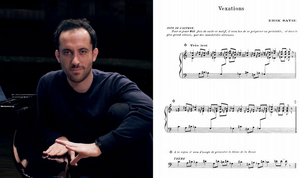Pianist Igor Levit To Give 20-Hour, Livestreamed Performance Of Satie's VEXATIONS

To raise awareness for the plight of artists worldwide amidst the coronavirus pandemic, pianist and 2018 Gilmore Artist Igor Levit gives a 20-hour, live-streamed, marathon performance transcending geographical borders and time zones. On Saturday, May 30 at 8:00 a.m. ET, from the b-sharp Studio in Berlin, he performs one of music history's longest compositions, Erik Satie's Vexations, which lasts approximately 20 hours. To support this project, Mr. Levit draws upon the $300,000 awarded to him two years ago as a Gilmore Artist.
The Gilmore presents the livestream via YouTube at youtu.be/zqQS_HTunCY (for the event page, visit thegilmore.org/streaming/igor-levit-vexations). The performance may also be accessed through streaming partners The New Yorker (newyorker.com) and Der Spiegel (click here) and will be shared by Mr. Levit himself on Twitter (@igorpianist).
Reflecting on the project, Mr. Levit said, "It has always been a strong wish of mine to be able to perform Erik Satie's Vexations. While written in the 19th century, this piece was revolutionary thanks to its atonal harmony. The few notes-a theme and two variations-fit on just one sheet. The 840 repetitions though herald early on a future of aesthetic repetitiveness.
"The sheer duration of over 20 hours of Vexations doesn't feel like a "nuisance" or "torture" to me, as the title would suggest, but rather a retreat of silence and humility. It reflects a feeling of resistance.
"That's why it feels right to play the Vexations right now. My world and that of my colleagues has been a different one for many weeks now and will probably remain so for a long time. Vexations represents for me a silent scream."
Erik Satie composed Vexations circa 1893, though the work was unknown until an associate of the composer brought it to light in 1949. The world premiere in 1963 was organized by avant-garde composer John Cage and performed by a team of pianists in shifts at Manhattan's Pocket Theatre. The meaning of the work is unclear and has been widely debated, and it has been theorized as parody, as a theoretical exercise, and even as a response to a failed romance.
Comments
Videos


